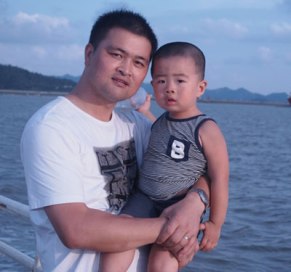
A Report by the Initium Media, published: August 31, 2015
Zhang Kai (张凯), a prominent Chinese rights lawyer who has been living for a year among Christians in Wenzhou, Zhejiang Province, and assisting in their litigation against the government’s encroachments,disappeared with his assistant on Aug. 25. They are understood to have been taken into custody by the authorities in relation to Zhang’s legal work. On Aug. 27, Chinese lawyer Yang Xinquan (杨兴权), director of Beijing Xinqiao Law Firm and Zhang Kai’s employer, posted the following report of Zhang’s legal activities in Wenzhou. He also announced that he was establishing a legal group for Zhang’s defense, much like the many which Zhang established to defend Christians when he was free. — The Editors
Zhang Kai, a lawyer who organized a legal team of over 30 to litigate religious cases across Zhejiang Province, was taken away by police in Wenzhou on Aug. 25, and hasn’t been heard from since.
 |
| Zhang Kai (张凯) |
On Aug. 8, Zhang shared his thinking with his friends on WeChat: “I’ve made up my mind: the most they can do is jail me. But if I stay silent, I’ll regret it my whole life.”
Two weeks later he and his assistant Liu Peng (刘鹏) were taken away by Wenzhou police.
Zhang Kai, 37, is a lawyer with the Xinqiao Law Firm (新桥律师事务所) in Beijing, and a Christian. Amidst the campaign to demolish crosses in Zhejiang, of all human rights lawyers in China, Zhang has been the most active and become the most deeply involved. Beginning with his representation of Wenzhou Salvation Church (救恩堂) pastor Huang Yizi (黄益梓) in August last year, he’s lived in Wenzhou and been counsel in many cases involving cross demolition. He said “I’m perfectly clear” about the fact that he’s treading in extremely dangerous political territory. In July, a reporter with the Hong Kong-based Initium Media (端传媒) bumped in Zhang on the destroyed steps of the Xialing Church[1] (下岭教堂). He was smiling and said that he wasn’t concerned about his personal safety: “How many large scale removals of crosses have you come across in history?” he remarked.
 |
| Believers and SWAT clashed when the cross of this church in Wenzhou was removed on July 21, 2014. Time Magazine has a video report. HTTP://TIME.COM/3382827/ CHINA-CHRISTIANS-CHRISTIANITY -SALVATION-CHURCH-WENZHOU -ZHEJIANG/ |
On July 10, Zhang originally planned to begin a lecture series titled “Laws and Decrees.” “‘Decrees’ (律法) are called ‘law’ in Christianity; the rules that the Lord created,” Zhang said. “Christianity teaches us to submit, but what we ought to submit to is the constitution and morality, not to illegal people and conduct.” But late the same night, as part of a violent nationwide crackdown sweeping up hundreds of lawyers, Zhang Kai was taken away by Wenzhou state security police and interrogated the night through. Later, in an interview with the Initium reporter, he said that public security officials told him: “Don’t stir up the Zhou Shifeng [周世峰] case,”[2] “Don’t hold legal seminars in Wenzhou,” and “Don’t get involved in religious cases in Zhejiang.” Clearly, Zhang Kai did not submit.
He maintained his residence at the Xialing Church, every day seeing pastors and believers from all over Zhejiang, exhausting every possible legal method to safeguard their rights, determined to resist to the end through the storm of cross demolitions.
A year ago, the authorities encountered fierce resistance when attempting to remove the cross from the Salvation Church in Wenzhou. Many people were beaten bloody in the struggle. Pastor Huang Yizi was in the end designated the leader of that resistance and sent to a year in jail for “gathering a crowd to disturb social order.” Zhang Kai was counsel to Huang.
Zhang Kai was meticulous and earnest in his litigation: he broke the suit into four cases, and mobilized 11 lawyers to help. For example: state policy says that criminal suspects have a right to legal counsel within 48 hours, but over 70 hours passed in Huang Yizi’s case before he was able to see his lawyer. So Zhang sued for compensation. Another was that Huang Yizi was prevented from receiving a copy of The Bible while in custody, so Zhang’s legal group initiated another suit. Zhang called this “China’s first case about reading scriptures in custody” (“全国首起看守所读经案”).
In another incident, the Zhejiang provincial government’s website featured the response to a letter from one of Huang’s defenders, sent to the “governor’s mailbox,” saying that he was wrongly imprisoned. The official response included language referring to “Huang Yizi’s criminal conduct.” So Zhang’s legal group initiated yet another case, saying that this was a “convicting without trial” and constituted defamation of his client. Zhang and his lawyers also collected over 1,000 signatures after Huang was arrested, and submitted an application to the authorities to hold a protest march.
As Zhang Kai saw it, all this was “the process of gambit.” “Filing a case is one thing, and filing a case without the court taking it up is another.”
 |
| Pastor Huang Yizi (黄益梓牧师) |
Zhang Peihong (张培鸿), a lawyer who worked with Zhang Kai on the Zhejiang cases, said that Zhang Kai had “hit on a new approach” in his chosen method of litigating the cases. “He did not let a single legal question lapse.” Zhang Peihong told Initium that lodging information requests with the government was part of citizens’ right to supervise state power. If the government has engaged in illegal conduct, it’s only natural to apply for an administrative explanation, and litigation can then be based on that. Demolishing crosses is illegal conduct, so correcting it would mean that the crosses are allowed to be erected. “All this is according to legal process. Just going by the book,” Zhang said.
This sort of endless legal game led the authorities to be both enraged and helpless—whether small or large, when government organs around Zhejiang ignored the law and acted at will, they’d be sued, and their conduct dealt with as “illegal acts” that must be resolved through a legal process.
Zhang Kai told Initium that three months later the Wenzhou authorities, frustrated beyond measure, proposed a deal: as long as Huang Yizi relieved Zhang Kai as his legal representative, he’d be free in a month. Zhang Kai was thus forced to recuse.
But the Wenzhou authorities went back on their word, and in March of this year sentenced Huang to a year in prison for gathering a crowd to disturb public order. Zhang, who was representing him again, said: “Originally they charged him with three crimes, with a minimum prison sentence of a decade.”
In Zhejiang, Zhang Kai organized a group of over 30 lawyers—Christians who hailed from all over China—to begin taking on church cases around the province. Up until July, Zhang told Initium, he represented four churches in Wenzhou. He organized a group of six lawyers to take on cases in Jinhua and Lishui in Zhejiang (浙江金华和丽水), and churches from around the province called on him to consult on matters of law one after another.
Establishing a rights defense league against the cross demolition campaign and taking on all manner of rights defense cases aren’t the only things Zhang did. During the same period he wrote a large number of articles, Weibo posts, and met with believers and the Christian “two organizations” (两会) (the China Christian Council and the Three-Self Patriotic Movement [基督教协会和三自爱国运动委员会]) , ensuring that when cross demolitions took place believers were aware of their legal rights.
“I calculated that there were roughly nine activities we could engage in: apply to hold marches, listen to testimony, impeach officials, write letters, bring suit, call for freedom of access to government information, and more,” Zhang Kai said. “Lawyers can’t necessarily prevent the crosses being removed, but at least they can expose the illegal nature of the exercise. Even if they were constructed against regulations, there should be a reasonable and legal process to remove them. Otherwise, where’s the legality?”
In November 2014, Zhang Kai became the legal representative for Wenzhou’s Xialing Church, using the methods he’d honed on the Huang Yizi case to bring a string of legal complaints against the authorities.
 |
Catholic clergy protesting in front of the government. (Photo: Weibo) |
After the failed attempt to remove the crosses at Xialing Church last November, the authorities handed down an “official statement of punishment” (处罚决定书) saying that because the church’s documentation was incomplete, it was designated an illegal structure and was to be demolished entirely. Zhang first requested an administrative review of the decision, and then initiated legal action against the response. At the same time he initiated freedom of information proceedings against each government department. As with all the other churches that had their crosses removed, the authorities severed its water and electricity supply. So Zhang Kai also sued the state grid.
This July, the authorities passed new “Zhejiang Provincial Religious Construction Regulations” (浙江省宗教建筑条例). The Regulations strictly limit the appearance of crosses: “A cross that appears atop the main body of the church building cannot exceed a proportion of 1/10 to the main church body.” This means that the cross can’t be placed on the church’s peak, but only on the outer wall. Many analysts say that the regulations were initiated to pave the way for removing crosses around the whole province. With these rules, they can rip crosses down without proving that they were built “illegally.”
Immediately, Zhang Kai made a formal application for public information about the law on behalf of Xialing Church: he demanded that the government provide its legal basis for formulating the Regulations, the procedures under which they were drawn up, the research and investigation report produced by an expert committee, the religious affiliations of the committee members, and the procedures and official organs responsible for enforcing the law once it was passed. He demanded that the government respond within 15 days, according to law, or else he would sue them.
“The relationship between Church and the government has reached an extremely strained point. But this is our right.” This was what Zhang Kai told fellow Christians over and over again.
Zhang Kai remembered the night he was taken away on July 10. A female domestic security agent who “looked like Fan Bingbing” remonstrated with him: “Look, Zhou Shifeng had some connections, but you have none. If you take on Wenzhou religious cases, you’re just looking for trouble.” Zhang Kai then began teaching her Christian principles.
“You’re wrong,” he said. “I have God as my backer.”
[1] Zhou Shifeng is a veteran rights defense lawyer and is the head of the Fengrui Law Office in Beijing, known for its heavy involvement in rights defense work. Fengrui was one of the primary targets of mass arrests and slander in the state press beginning in July.
[2] The Xialing Church in Lucheng District, Wenzhou, was established in 1993 as a government-sanctioned church. Since the middle of last year, authorities have made repeated attempts to tear down its cross, efforts staunchly resisted by believers. In October last year security officials demolished the church’s outer wall and left its stairs a rubble.
China Aid Contacts
Rachel Ritchie, English Media Director
Cell: (432) 553-1080 | Office: 1+ (888) 889-7757 | Other: (432) 689-6985
Email: [email protected]
Website: www.chinaaid.org